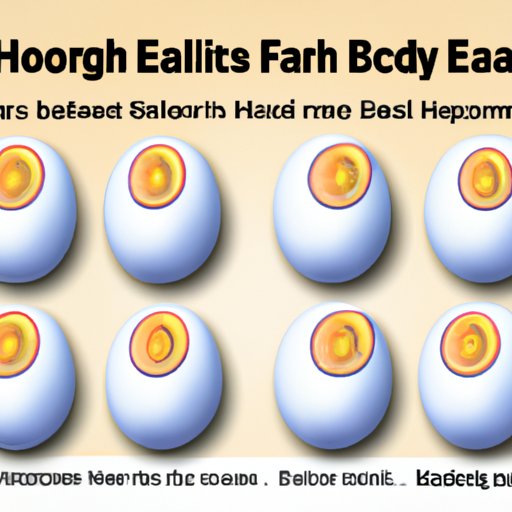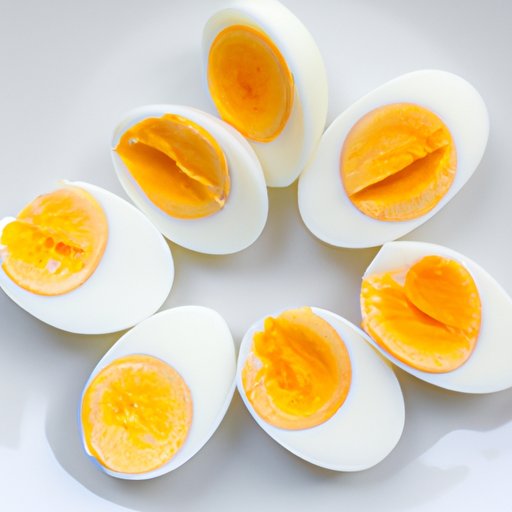I. Introduction
Hard boiled eggs are a staple in many households as they are nutritious, versatile, and easy to prepare. However, cooking a hard boiled egg consistently can be a challenge for many people, resulting in undercooked or overcooked eggs that are difficult to peel. This article aims to provide a step-by-step guide on how to cook perfect hard boiled eggs every time, as well as offer tips and tricks for peeling eggs and creative ways to incorporate them into your meals. In addition, we will explore the health benefits and nutritional value of consuming hard boiled eggs. So, let’s get started.
II. 5 Simple Steps to Perfectly Cook a Hard Boiled Egg
Follow these five easy steps to cook a perfect hard boiled egg:
Step 1: Choose the right pot and eggs
Use a pot that is large enough to accommodate the eggs without overcrowding. The eggs should be in a single layer and covered with at least an inch of cold water. This ensures that the eggs cook evenly. Use eggs that are at least a week old and have been stored in the refrigerator. Fresh eggs are difficult to peel, as the membrane sticks to the egg white.
Step 2: Prepare the eggs for boiling
Using a sharp pin or needle, prick a small hole in the rounded end of each egg. This allows air to pass through the shell, preventing the eggs from cracking during cooking. If you prefer to peel the eggs by tapping them on a hard surface, skip this step. However, it’s still a good idea to prick the eggs to prevent the whites from seeping out if the shell cracks.
Step 3: Boil the eggs for the right amount of time
Place the pot on high heat and bring the water to a rolling boil. Once the water starts to boil, reduce the heat to low and set a timer for 12 minutes. Hard boiled eggs should be cooked slowly at a gentle simmer to prevent the egg whites from becoming rubbery and the yolks from turning green.
Step 4: Cool the eggs down quickly
As soon as the timer goes off, remove the eggs from the pot using a slotted spoon and place them in a bowl filled with ice water. Cooling the eggs down quickly stops the cooking process, prevents the yolks from turning green, and makes them easier to peel.
Step 5: Peel the eggs carefully
Once the eggs are cool, take them out of the ice water and gently tap them on a hard surface to crack the shell. Roll the egg gently between your hands to loosen the shell, and then peel the shell under cold running water. This makes the shell easier to remove and prevents bits of shell from sticking to the egg white.
III. The Foolproof Method to Making Hard Boiled Eggs Every Time
If you find it challenging to cook hard boiled eggs consistently, try the foolproof method below:
Step 1: Choose the right pot and eggs
Use the same guidelines as in step 1 above.
Step 2: Prepare the eggs for boiling
Bring a pot of water to boil and gently place the eggs in the boiling water using a slotted spoon. This will help prevent the eggs from cracking. Skip step 2 above if using this method.
Step 3: Cook the eggs for the right amount of time
Once the eggs are in the pot, cover it with a tight-fitting lid and turn off the heat. Set a timer for 14-15 minutes for large eggs or 12-13 minutes for medium eggs. Let the eggs sit in the hot water for the allotted time.
Step 4: Cool the eggs down quickly
Follow step 4 above.
Step 5: Peel the eggs carefully
Follow step 5 above.
IV. The Best Timing and Temperature for Cooking Hard Boiled Eggs
The optimal time and temperature for cooking hard boiled eggs are essential to getting them right. The general rule of thumb for cooking hard boiled eggs is to simmer them gently in a pot of water. However, there are other factors to consider when cooking the perfect hard boiled egg.
Depending on the size of the eggs and the desired yolk texture, cooking times may vary. For a softer yolk, reduce the cooking time by a minute or two. For firmer yolks, add a minute or two to the cooking time. Additionally, high elevation may affect the water’s boiling point, so you may need to adjust the cooking time accordingly.
V. Expert Tips for Peeling Hard Boiled Eggs
Peeling hard boiled eggs can be frustrating, especially if the shell sticks to the egg white. Here are some tips and tricks for making it easier:
– Peel the eggs under cold running water to prevent bits of shell from sticking to the egg white.
– Tap the egg gently on a hard surface to crack the shell, roll it between your hands to loosen it, and then peel it under running water.
– Add a teaspoon of baking soda to the water before boiling the eggs. This increases the pH of the water, making the eggs easier to peel.
VI. 10 Ways to Enjoy Hard Boiled Eggs in Your Meals
Hard boiled eggs are an excellent source of protein and can be enjoyed in various ways. Here are ten creative ideas to help you incorporate them into your meals:
1. Deviled eggs – Scoop out the yolk, mix it with mayo, mustard, and seasoning, and fill the egg whites with the mixture.
2. Egg salad – Chop up the eggs and mix them with mayo, celery, onion, and seasoning.
3. Cobb salad – Add sliced hard boiled eggs to a bed of greens, cooked bacon, tomato, and avocado.
4. Huevos rancheros – Top tortillas with refried beans, salsa, sliced hard boiled eggs, and shredded cheese.
5. Scotch eggs – Wrap hard boiled eggs in sausage, coat in breadcrumbs, and bake or fry until crispy.
6. Breakfast sandwich – Layer sliced hard boiled eggs, bacon, and cheese between two slices of toast.
7. Nicoise salad – Arrange sliced hard boiled eggs, olives, green beans, tomato, and tuna on a bed of lettuce.
8. Ramen bowl – Add sliced hard boiled eggs, veggies, and broth to a bowl of ramen noodles.
9. Pickled eggs – Soak hard boiled eggs in a pickling mixture of vinegar, sugar, and spices for a tangy snack.
10. Avocado egg boats – Scoop out the center of an avocado, crack a hard boiled egg into the cavity, and bake until the egg is set.

VII. Hard Boiled Eggs: Health Benefits and Nutritional Facts
Hard boiled eggs are not only delicious but incredibly nutritious. Here are some health benefits of consuming hard boiled eggs:
– They are a great source of protein, which helps build and repair muscles, tissues, and cells.
– They contain essential vitamins and minerals such as vitamin A, vitamin D, iron, and zinc.
– They are low in calories and fat, making them an ideal food for weight management.
– They are high in choline, a nutrient that is essential for brain function and development.
One large hard boiled egg contains roughly 78 calories, 6 grams of protein, and 5 grams of fat, of which only 1.6 grams is saturated fat.
VIII. Conclusion
Hard boiled eggs are a healthy and versatile food that can be enjoyed in various ways. By following the steps outlined in this article, you can cook perfect hard boiled eggs every time and enjoy their numerous nutritional benefits. Remember to use fresh eggs that have been stored in the refrigerator, prick the rounded end of the egg to prevent it from cracking, and cool them down quickly after boiling. With these tips and tricks, you can enjoy delicious hard boiled eggs in your meals and snacks.
